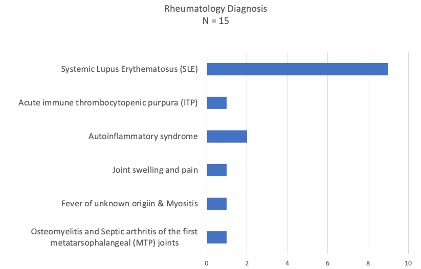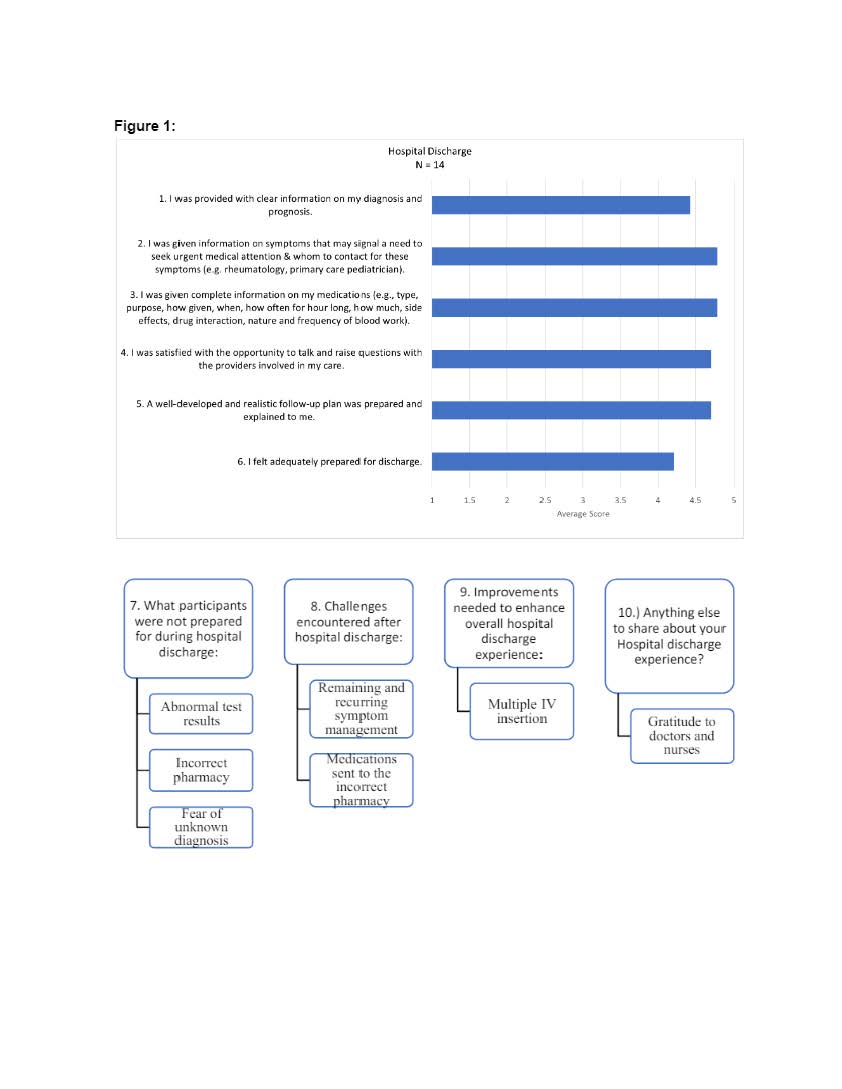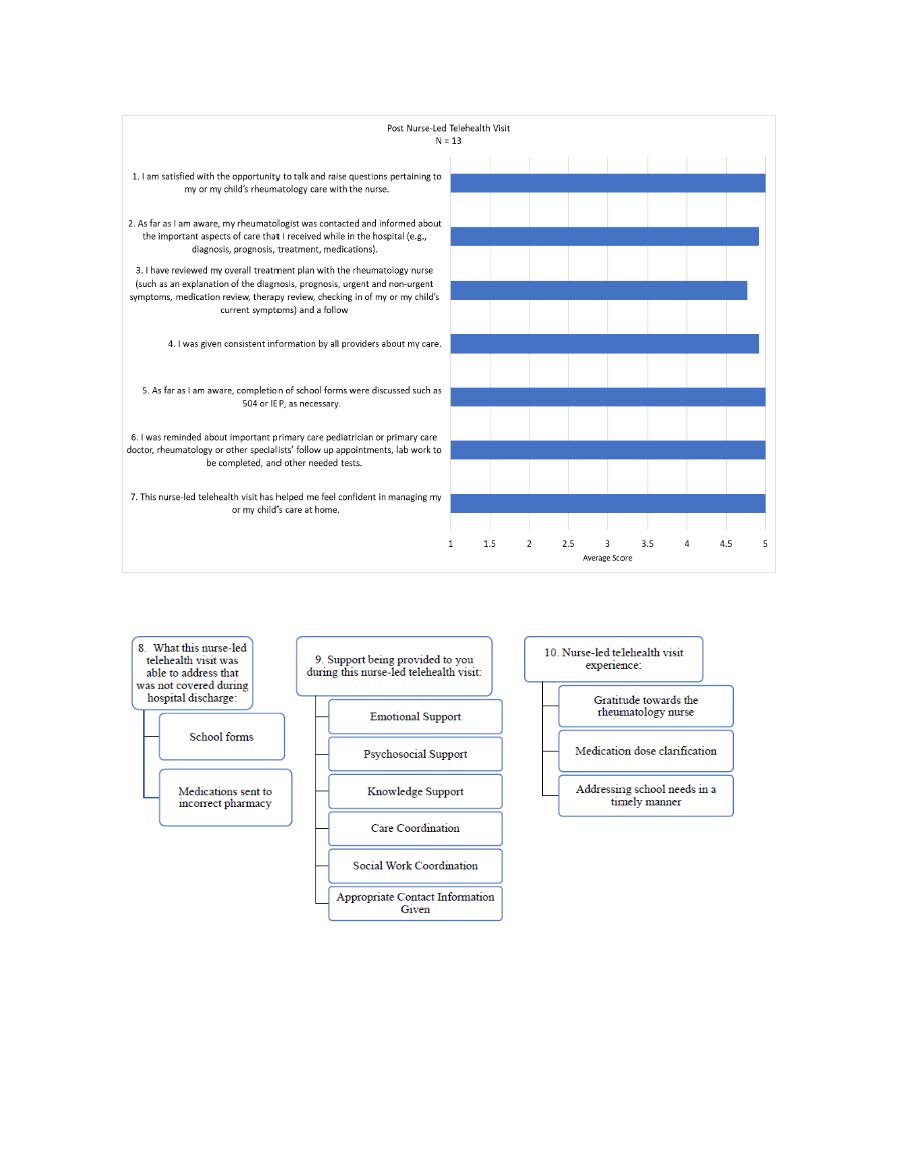Session Information
Session Type: Poster Session B
Session Time: 10:30AM-12:30PM
Background/Purpose: When pediatric rheumatology patients are discharged from a hospital, the period between hospital discharge & outpatient care transition creates a care gap when there is no standardized mechanism to provide care. In order to address this care gap and provide continuity of care, this quality improvement project aims to describe the patients’ perceptions on continuity of care from the nurse-led telehealth discharge visit program implemented to pediatric rheumatology patients.
Methods: The nurse-led telehealth discharge program was implemented to 15 pediatric rheumatology patients discharged from a pediatric teaching hospital in Northern California within 30 days post hospital discharge.The Patient Continuity of Care Questionnaire (PCCQ) was modified with the original author’s permission, Hadjistavropoulos et al. (2008). The PCCQ #1–Hospital Discharge survey refers to the patients’ hospital discharge experience & the PCCQ #2–Post Nurse Led Telehealth Visit survey refers to the patients’ nurse-led telehealth discharge visit experience. Descriptive statistics looking at the mean scores of the PCCQ serve as the description of the patients’ perceptions on continuity of care. Open-ended questions were analyzed separately using content analysis to discover themes. Rheumatology diagnosis was also included.
Results: Most participants were diagnosed upon hospital discharge with Systemic Lupus Erythematosus (Figure 1). Of the 14 participants who completed the PCCQ #1-Hospital Discharge survey, questions 2&3 (Figure 2) had the highest mean scores of 4.79 where participants felt that they were given information on when to seek urgent medical attention & their medications. Meanwhile, question 6 (Figure 2) which asked about how participants felt adequately prepared for discharge had the lowest mean score of 4.21. For the open ended questions, recurring symptom management & medications sent to the incorrect pharmacy were the challenges participants encountered after hospital discharge.
Of the 13 participants who completed the PCCQ #2-Post nurse led telehealth survey, questions 1,5,6&7 (Figure 3) had the highest mean scores of 5.0. Participants were satisfied of the opportunity to talk with the nurse. School forms completion, reminders on rheumatology follow up appointments, lab work & other needed tests were also discussed. The nurse-led telehealth visit helped participants feel confident in managing their care at home. For the open ended questions, a theme emerged where participants felt that the nurse-led telehealth discharge visit provided them with emotional, psychosocial, knowledge, care coordination and medication dose clarification support.
Conclusion: A nurse-led telehealth discharge visit program performed by the outpatient pediatric rheumatology registered nurse can provide continuity of care to pediatric rheumatology patients during the critical transition from hospital discharge to outpatient care. Bridging the care gap between post hospital discharge and outpatient care through the use of a nurse-led telehealth discharge visit program provided pediatric rheumatology patients & their families the emotional, psychosocial, knowledge and care coordination support that they need.
Disclosures: A. Ramirez: None; L. Walker-Vischer: None; T. Lee: None.
To cite this abstract in AMA style:
Ramirez A, Walker-Vischer L, Lee T. Bridging the Care Gap Between Hospital Discharge and Outpatient Care Transition for Pediatric Rheumatology Patients: An RN-led Quality Improvement Project [abstract]. Arthritis Rheumatol. 2024; 76 (suppl 9). https://acrabstracts.org/abstract/bridging-the-care-gap-between-hospital-discharge-and-outpatient-care-transition-for-pediatric-rheumatology-patients-an-rn-led-quality-improvement-project/. Accessed .« Back to ACR Convergence 2024
ACR Meeting Abstracts - https://acrabstracts.org/abstract/bridging-the-care-gap-between-hospital-discharge-and-outpatient-care-transition-for-pediatric-rheumatology-patients-an-rn-led-quality-improvement-project/



